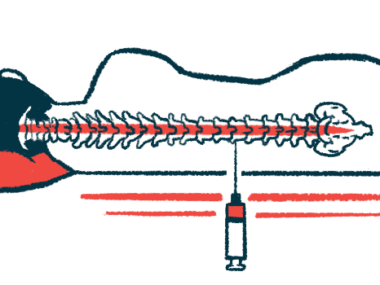FDA Grants Shift’s E1v1.11 Orphan Drug Status for SMA
Written by |

Shift Pharmaceuticals said its investigational lead therapy E1v1.11 has been granted orphan drug designation by the U.S. Food and Drug Administration (FDA) as a potential treatment option for spinal muscular atrophy (SMA).
SMA is caused by mutations in the survival motor neuron 1 (SMN1) gene, which leads to lower production of SMN, a key protein for motor neuron survival.
The SMN2 gene is a nearly identical copy of SMN1 that also codes for functional SMN protein. However, this gene naturally produces much lower amounts of SMN (10% to 15% of all functional SMN protein), because a genetic event known as alternative splicing removes a part of the gene called exon 7. Exons are the sequences within genes that code for proteins; alternative splicing allows for a single gene to give rise to many different proteins.
E1v1.11 is an antisense oligonucleotide (ASO) that targets the SMN2 gene and stimulates increased production of the SMN protein. SMA-targeted ASOs, such as Spinraza (nusinersen), marketed by Biogen, are designed to increase SMN2’s ability to produce a functional SMN protein by correcting SMN2’s splicing.
E1v1.11 is optimized with a phosphorodiamidate morpholino oligomer (PMO), a chemical modification that can help with an ASO’s stabilization, target binding, and therapeutic effects.
Specifically, the molecule blocks Element 1 (E1), a regulatory element in the SMN2 gene that acts as a potent repressor of SMN2 exon 7 splicing. By blocking E1, exon 7 inclusion is enhanced and protein production is stimulated.
Previous studies have shown that a single administration of E1v1.11, via an intracerebroventricular injection — directly into a specific region of the brain — increased the lifespan and motor performance of mice with severe forms of SMA, in a dose-dependent manner. Researchers believe that this specific ASO is able to target SMN2 with great specificity and has the potential for future SMA clinical applications.
The orphan drug status further supports E1v1.11’s development. The designation is given to treatments for rare diseases, defined in the U.S. as disorders that affect fewer than 200,000 people.
The status comes with certain benefits, including financial incentives for drug development and commercialization, U.S. market exclusivity for seven years following approval, FDA support for clinical studies, and fee exemptions and reductions.
Shift won a $2.7 million grant through the Congressional Directed Medical Research Program (CDMRP) to further the development of E1v1.11. “This funding will allow the company to move our lead candidate forward towards IND filing and clinical trials,” CEO Steve O’Connor said in a May 2019 news release announcing the funding.
Shift Pharmaceuticals was launched in 2018 by University of Missouri researchers to test the clinical potential and effectiveness of E1v1.11 in SMA.



